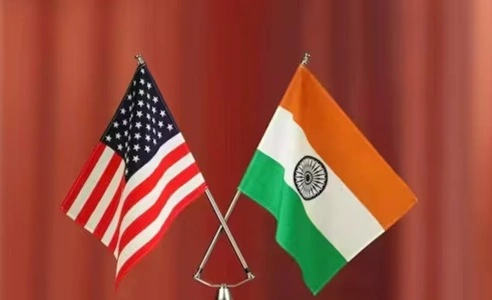In a significant move reflecting growing trust and collaboration, the United States has removed three Indian nuclear entities from its trade blacklist. This development, announced on January 16, 2025, marks a major step forward in Indo-US strategic relations, paving the way for enhanced cooperation in nuclear technology and other advanced sectors.
The entities removed from the US Entity List are the Directorate of Construction, Services, and Estate Management; the Heavy Water Board; and NPCIL (Nuclear Power Corporation of India Limited)-related units. This decision not only signifies deepening trust between the two nations but also bolsters India’s ambitions in nuclear energy and self-reliance in technology.
What is the US Entity List?

The US Entity List is a trade blacklist maintained by the US Department of Commerce. Entities on this list face stringent restrictions on their ability to engage in trade and technology transfers with American firms. The inclusion of organizations on this list often stems from concerns over national security, proliferation risks, or compliance with international laws. Being delisted represents a shift in perception, recognizing the entity’s adherence to global norms and responsible behavior.
A Milestone in Strategic Relations
The removal of these restrictions underscores the growing strategic partnership between India and the US, built on shared democratic values, mutual economic interests, and security cooperation. This move comes as a continuation of the evolving relationship, following agreements such as the Civil Nuclear Deal of 2008 and subsequent collaborations in defense, technology, and energy.
US officials emphasized that the decision is part of efforts to strengthen ties with India, particularly in light of its responsible record in non-proliferation and its growing role as a global leader in clean and safe energy solutions. The delisting sends a strong signal of the US’s confidence in India’s nuclear governance and its commitment to bolstering India’s technological and energy ambitions.
Impact on India’s Nuclear Sector
India’s nuclear energy program, crucial for meeting its ambitious clean energy targets, will directly benefit from this decision. With restrictions lifted, Indian entities can now access advanced US-origin technologies and collaborate with American firms without bureaucratic hurdles.
The Heavy Water Board, for instance, plays a critical role in supplying heavy water for nuclear reactors. Access to cutting-edge technologies can enhance efficiency and scale operations, enabling India to expand its nuclear energy capacity. Similarly, the Directorate of Construction, Services, and Estate Management oversees key infrastructure projects, which are expected to receive a boost from this improved access to technology and materials.
Implications for Trade and Technology Transfers
The removal of these entities from the blacklist facilitates smoother trade and technology transfers between India and the US. It opens doors for:
- Collaborative Research: Indian and American institutions can now collaborate on advanced research in nuclear science and related fields without legal and logistical barriers.
- Technology Upgrades: Access to cutting-edge American technology will modernize India’s nuclear infrastructure and boost energy security.
- Economic Growth: The decision could lead to increased investments and joint ventures in India’s nuclear energy sector, driving job creation and industrial growth.
- Energy Security: With expanded nuclear energy capabilities, India can diversify its energy mix, reducing reliance on fossil fuels and achieving its carbon neutrality goals.
Geopolitical Significance
The timing of this decision is noteworthy as it aligns with the growing strategic competition between the US and China in Asia. By strengthening ties with India, a key player in the Indo-Pacific, the US seeks to counterbalance China’s influence in the region. For India, this move aligns with its efforts to enhance energy security, modernize its infrastructure, and deepen its technological capabilities.
Furthermore, this decision demonstrates India’s rising stature as a responsible global actor. Its adherence to international norms, including the Nuclear Suppliers Group (NSG) guidelines, despite not being a member, reinforces its credibility in the global nuclear community.
Challenges Ahead
While the delisting is a positive development, challenges remain. India’s nuclear sector still faces hurdles such as high costs, public apprehension regarding nuclear safety, and international lobbying to gain NSG membership. Continued collaboration with the US could help India overcome these challenges by providing access to affordable technologies and fostering confidence in nuclear safety measures.
Conclusion
The US’s removal of trade curbs on three Indian nuclear entities marks a turning point in Indo-US relations, reflecting mutual trust and shared aspirations for a stable, energy-secure future. This decision strengthens India’s position as a responsible nuclear power and paves the way for transformative advancements in energy and technology. As the two democracies deepen their partnership, this development stands as a testament to their commitment to progress, sustainability, and global security.

